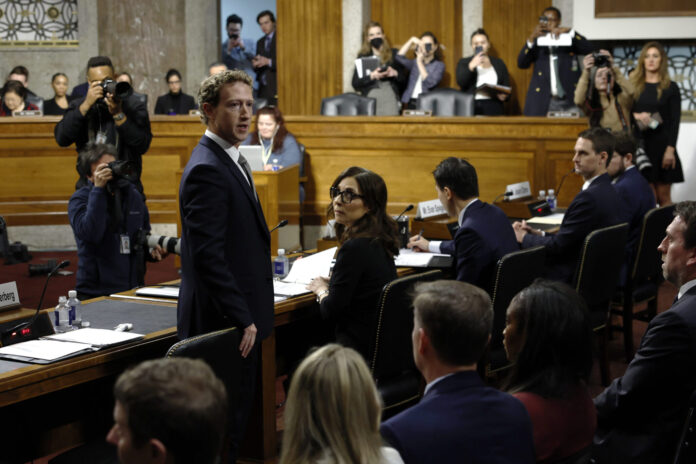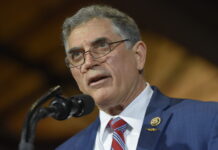
(States Newsroom) — Members of the U.S. Senate Judiciary Committee castigated executives at leading social media companies Wednesday, calling for more to be done to shield children from sexual exploitation, drug dealing, self-harm encouragement and other damaging content.
In one tense exchange, Missouri Republican Sen. Josh Hawley demanded to know if Mark Zuckerberg, the founder of Facebook, had ever apologized to his platforms’ victims — prompting Zuckerberg to turn around and briefly speak to the audience of family members in the Senate committee room, saying he was sorry for what they have gone through.
Senators of both parties during the four-hour, emotionally charged hearing promoted a raft of bills the committee has unanimously passed that they say would add significant accountability to tech platforms.
And they urged the tech executives — including Zuckerberg of Meta, Shou Chew of TikTok and Linda Yaccarino of X — to work with them on legislation or risk being “regulated out of business.”
Social media users, especially children and teens, are vulnerable to online scams, extortion and other dangerous material, several senators said.
More than 100,000 instances of child sexual abuse material are reported daily, said Senate Judiciary Chairman Dick Durbin, an Illinois Democrat.
Children and teens are also subject to “sextortion,” where predators trick them into providing compromising material, then demand payments to keep the images from being shown publicly, he said.
The psychological damage from such episodes can lead to suicide, Durbin and other senators noted.
The panel’s ranking Republican, Lindsey Graham of South Carolina, said he had concluded that, perhaps despite company founders’ initial aims, social media platforms are “dangerous products” that are “destroying lives, threatening democracy itself.”
“You have blood on your hands,” he said in an opening statement, prompting the first of several rounds of applause from an audience filled with family members of victims of online exploitation. “You have a product that’s killing people.”
Big tech defense
The social media executives acknowledged that their platforms could be exploited by bad actors, but said harmful content made up small portions of what appeared on their platforms and noted their companies had teams working to control unsafe material.
The executives declared a responsibility to protect users from dangerous content.
“All of us here on the panel today and throughout the tech industry have a solemn and urgent responsibility to ensure that everyone who uses our platforms is protected from these criminals, both online and off,” Jason Citron, CEO of the video game-focused platform Discord Inc., said.
But the executives were hesitant to commit their support to legislation touted by senators that would expand protections for social media users.
Graham asked Citron if he supported several policy changes, including repealing Section 230 of the Communications Act that protects online companies from liability for content on their platforms.
Citron didn’t endorse any.
“So here you are,” Graham said. “If you wait on these guys to solve the problem, we’re going to die waiting.”
Senators demand votes
Graham called for “a day of reckoning on the floor of the United States Senate” to have votes on the proposals passed out of the committee.
Those bipartisan bills include Graham’s legislation to remove Section 230 protections in the cases of sexual exploitation of minors and a bill from Minnesota Democrat Amy Klobuchar to criminalize distribution of revenge porn.
Graham, Klobuchar and other members of the committee said opening the companies to legal liability was key to making the user experience safer.
Klobuchar said the platforms could be venues for drug dealing, citing examples of people who died after buying fentanyl-laced pills on social media platforms.
“When a Boeing plane lost a door in mid-flight several weeks ago, nobody questioned the decision to ground a fleet of over 700 planes,” she said. “So why aren’t we taking the same type of decisive action on the danger of these platforms when we know these kids are dying?”
North Carolina Republican Thom Tillis urged the executives to “secure your platforms.”
“Do you not have an inherent mandate to deal with this?” he said. “Because it would seem to me if you don’t, you’re going to cease to exist. I mean, we could regulate you out of business if we wanted to.”
Hawley and Zuckerberg
In the back-and-forth between Hawley and Zuckerberg, Hawley urged the billionaire social media pioneer to compensate victims of abuse on his company’s platforms.
Zuckerberg said his job was to make platforms safer, which his company took seriously.
“Have you apologized to the victims?” Hawley asked Zuckerberg. “Would you like to do so now? They’re here, you’re on national television. Would you like now to apologize to the victims?”
Zuckerberg stood and turned around to face the audience. His full remarks were not captured by the microphone he had turned away from, but he could be heard saying he was sorry for what families had experienced.
“No one should have to go through the things that your families have suffered,” he said. “This is why we invest so much and are going to continue to do industry-leading efforts to make sure that no one has to go through the types of things that your families have had to suffer.”
The audience, which had applauded Hawley’s aggressive questioning, was silent as Zuckerberg sat and turned back to the senators.
TikTok Chinese ties again under fire
A few Republican senators asked Chew about the data security of TikTok users, noting the platform’s parent company was based in China and subject to the Communist country’s requirements to share data with the government.
The issue was the subject of its own U.S. House hearing last year, with Chew as the sole witness.
TikTok “is subject to the control and inspection of a foreign, hostile government that has actively tried to track the information and whereabouts of every American they can get their hands on,” Hawley, who has a bill to bar the platform from the United States, told Chew Wednesday. “Your app ought to be banned in the United States of America.”
Chew said the company, which is headquartered in the U.S., has a program based in Texas that is dedicated to users’ data security.
Arkansas Republican Tom Cotton questioned Chew’s personal loyalties. Cotton, a former U.S. Army captain, asked if Chew, a citizen of Singapore, had ever been a member of the Chinese Communist Party.
“No, Senator,” Chew answered. “Again, I’m Singaporean.”
Chew, who is married to a U.S. citizen and has two children who are U.S. citizens, said he had “not yet” applied for his own U.S. citizenship. He and his family live in Singapore, he said.
Cotton pushed Chew to label Chinese President Xi Jinping a dictator. Chew declined to answer, saying he was there to answer questions about his company, not comment on world leaders.
“Are you scared that you’ll lose your job if you say anything negative about the Chinese Communist Party?” Cotton asked. “Are you scared that you’ll be arrested and disappeared the next time you go to mainland China?”
Chew said content critical of the Chinese regime could be found on TikTok.
Compelled to testify
Zuckerberg and Chew appeared at the hearing voluntarily, Durbin said, while the others — Yaccarino, Citron and Snap CEO Evan Spiegel — testified only after they received subpoenas. U.S. marshals had to visit Discord’s San Francisco headquarters to serve Citron, he added.
Each of the five companies represented at the hearing took steps to improve child-safety features in recent days, Durbin said, derisively noting the timing was “coincidentally” just before the hearing.
“Coincidentally, coincidentally, several of these companies implemented common-sense child safety improvements within the last week,” he said. “Days before their CEOs would have to justify their lack of action before this committee.”







